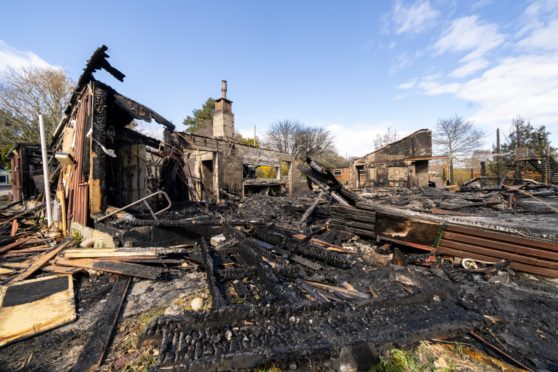
It is recognised worldwide as a centre for lifestyle alternatives, spirituality and commitment to the environment.
Now entering its sixth decade, the Findhorn Foundation on Scotland’s north-east coast has developed from a single caravan plot in the 1960s to an eco-village generating millions a year from its residential courses.
But a recent regime change, coupled with the crushing economic effects of Covid and Brexit, has led to some critics suggesting the peace and love ethos has turned a little darker.
In April, a long-term staff member razed a key building to the ground in revenge for being made redundant. It will cost £400,000 to replace.
Joseph Clark has since pleaded guilty to wilful fire-raising at Inverness Sheriff Court, and is in custody awaiting sentence. He asked not to be bailed.
Clark, 49, worked at the Findhorn Foundation for 16 years as a manager of the organisation’s timber-built community centre and dining hall that he destroyed. Along with 50 other staff, he was told that he would lose his job and the free accommodation and meals that went with it.
However, while condemning Clark’s response to his redundancy, some former colleagues say it did not happen in isolation.
One former staff member – who asked not to be named – said the redundancies have been brutal. “We all know the pandemic has affected everything, not just this place,” she said. “But it still felt convenient for them and the plan they set out a couple of years ago.
“Despite all the warm words from the stewards [management], the way we’ve just been put out has felt brutal. I’ve been here for eight years and felt part of the core. How wrong was I?
“What Joseph did was completely wrong. He has had several issues with the management of the foundation over the years and his own health problems, but he might have been channelling the hurt and anger we have all been feeling.”
In its annual report released in January this year, the Findhorn Foundation management admitted the pandemic had merely accelerated a three-year change process designed to make the charity more profitable, and included reducing staff costs.
Chief executive of the charity, Caroline Matters, said the Covid pandemic “has forced us to dig deeper and accelerate our efforts”.
“We are in the midst of some of the hardest decisions we have ever had to make as an organisation,” she said. “The ongoing uncertainties of Covid regulations mean that we will not be running our usual calendar of programmes.”
These programmes provide the charity with the bulk of its income. When this suddenly dried up, staff cuts were inevitable and swift.
Finance director Simon Steadman said: “Overnight, 80% of our income evaporated.”
However, increasing staff costs over recent years had already led to the foundation running at a loss and redundancies were already in the pipeline when the pandemic hit.
Steadman added: “The biggest financial challenge facing the foundation was the fact that for many years educational income had not been sufficient to cover expenditure and, in particular, the ever-growing cost of employing staff. Between 2016 and 2020, staff costs grew by 50%.”
More online courses are planned, reducing the need for support staff and guests’ air travel – 72% of the residential participants fly in from outside the UK, which compromises the charity’s eco ethos.
The charity is fundraising to rebuild and with workshops continuing this summer, including a scheduled wild-camping retreat in August called Out Of The Ashes: Turning Crisis Into Opportunity.
The foundation said: “Our focus is now the rebuilding of our much-loved community spaces and raising the £1 million-plus needed to rebuild them.”
Financial statements lodged with the Office of the Scottish Charity Regulator (OSCR) show the charity is valued at just over £5m and earns £2.2m a year from its residential courses. However, the cost of providing these outstrips the income by nearly £200,000 a year, with over 40% relating to direct staff costs.
Residential staff have free accommodation, meals and energy, which are not included in the direct staff costs. They also receive a monthly income of £265.
Under the rules of charitable status, the foundation has had to alert the OSCR to its financial predicament, detailing its plan to achieve financial stability.
The OSCR said: “As regulator, we expect charity trustees to make sure finances are managed responsibly.
“Charities have a duty to be transparent about their finances with us and the public, and this information is available to everyone on the Scottish Charity Register.
“Financial viability is not directly an issue for us, but charities must make sure that they are continuing to achieve their charitable purposes if they wish to remain registered.”
The foundation
The Findhorn Foundation began life in 1962 when ex-RAF officer Peter Caddy moved his wife and their three young sons into a caravan in Findhorn.
Their friend Dorothy Maclean also moved in with the Caddys. The three had a shared interest in spiritualism and also growing their own fruit and vegetables.
The garden they created attracted interest from visiting horticulturalists and stories spread of exceptionally large veg grown by “summoning nature spirits”.
People with similar beliefs started to move into the area and a community formed.
In 1972, it was formally registered as a Scottish charity under the name Findhorn Foundation and by the 1980s it had about 300 members. Over the years it has attracted visits from A-list stars such as Burt Lancaster and Shirley MacLaine. More recently Ruby Wax and Frankie Boyle have spent time there.
Following a period of expansion in the late 1990s the foundation has developed into a sprawling eco-village, providing accommodation for staff, guests and permanent residents.

Enjoy the convenience of having The Sunday Post delivered as a digital ePaper straight to your smartphone, tablet or computer.
Subscribe for only £5.49 a month and enjoy all the benefits of the printed paper as a digital replica.
Subscribe © Findhorn Foundation
© Findhorn Foundation